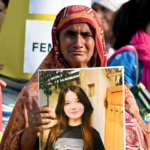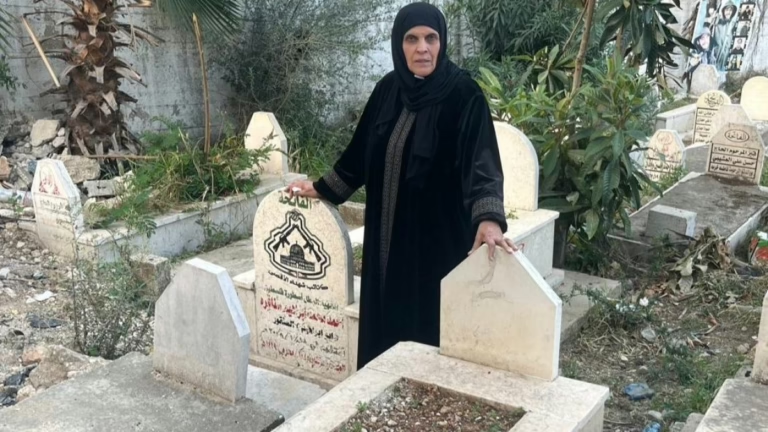Balata Refugee Camp, Occupied West Bank – Jameela Sanaqra has lost all three of her sons, with two confirmed killed by Israeli forces.
Her family-food-poisoning-after-threat-video/” title=”Tragic End: Couple and Their 3 Children Die from Food Poisoning in Enugu Just a Week After Man's Chilling Threat to 'Wipe Out Entire …' (Video)”>youngest son, Mahmoud, was fatally shot by Israeli commandos inside his bedroom on February 27, just days before he would have turned 26.
After the shooting, soldiers took Mahmoud’s body and have yet to return it to the family.
Jameela remains uncertain whether Mahmoud is alive or deceased, a painful ambiguity that deepens her anguish.
“Palestinian mothers bear their children twice: once in the womb and again on the day they carry them to their graves,” the 67-year-old mother shared from her home in Balata refugee camp.
Mahmoud is believed to be among over 2,220 Palestinians killed in the occupied West Bank and Gaza whose bodies are withheld by Israeli authorities-often stored in refrigerated facilities or buried in numbered graves, according to the Palestinian National Campaign for the Recovery of Martyrs’ Bodies.
The Jerusalem Legal Aid and Human Rights Center (JLAC) describes this practice as a deliberate tactic of war, designed to deny Palestinian families the chance to mourn and find closure.
Like countless other Palestinian mothers, Jameela has been robbed of the chance to lay her son to rest.
Balata Camp Under Siege
Located east of Nablus, Balata is the largest refugee camp in the occupied West Bank, established in 1950.
Covering less than 0.25 square kilometers-roughly the size of 35 soccer fields-it is home to over 33,000 residents packed into its narrow alleys.
Walls and windows throughout the camp are adorned with portraits of more than 45 Palestinians whom locals say were killed by Israeli forces since October 7.
Palestinian resistance factions operate within Balata’s maze-like streets and densely built homes, posing a persistent challenge to the Israeli military presence.
Overlooking the camp stands the Byzantine-era Greek Orthodox Church known as Jacob’s Well, while nearby lies Joseph’s Tomb, a site sacred in Judaism as the burial place of the biblical patriarch Joseph.
For Palestinians, the area also holds spiritual significance as the resting place of Sheikh Yousef Dweikat, an esteemed religious figure from the 18th century.
Joseph’s Tomb’s importance to Jewish tradition and Zionist narratives has made it a flashpoint, targeted by far-right factions within Netanyahu’s coalition seeking Israeli control.
Armed settler groups, often escorted by soldiers, frequently storm the site to intimidate Palestinians, perform religious ceremonies, and provoke confrontations.
Since the escalation following Hamas’s attacks on October 7, 2023, Balata has been effectively besieged by Israeli forces.
Military raids routinely demolish roads and dozens of buildings, leaving widespread destruction.
The United Nations Relief and Works Agency (UNRWA) describes Balata as resembling a ghetto, plagued by some of the highest unemployment, poverty, and food insecurity rates in the West Bank. Over 60% of its population is under 18 years old.
The Withholding of Bodies as Collective Punishment
The Sanaqra family has prepared a grave plot in Balata’s cemetery for Mahmoud, beside the resting places of his brothers Ahmad and Ibrahim.
They await either Mahmoud’s body or confirmation of his death, though both seem unlikely to come.
JLAC reports that Israel continues to hold bodies dating back to the 1967 war.
“The occupation authorities exert control over the deepest human grief, forcing families into endless waits to reclaim their children’s remains,” states a JLAC report on the campaign to recover war victims’ bodies.
In her living room, Jameela sat with two of her daughters, Bara’a and Amira, and two grandchildren, while her husband quietly observed from the doorway.
She believes the refusal to return Mahmoud’s body is a form of collective punishment linked to her eldest son Ahmad’s involvement with Palestinian armed groups before his death in 2008 at age 20.
“It’s a desecration,” Jameela said. “It tortures families, especially mothers. Without a grave, I cannot pray for him, speak to him, or mourn in peace.”
Requests for comment from the Israeli military regarding Mahmoud’s case went unanswered.
Endurance Amidst Punishment
Mahmoud’s life was marked by trauma and loss from an early age.
A poignant image from the second Intifada shows five-year-old Mahmoud shielding his tears as he surveys the ruins of his home, demolished by soldiers in retaliation for his brother Ahmad’s resistance activities.
In 2006, during an Israeli raid on Balata, Mahmoud’s middle brother Ibrahim-who was not involved in resistance-was fatally shot in the leg while searching for Ahmad.
Two years later, Mahmoud was photographed mourning over Ahmad’s body after his assassination; Ahmad had joined the resistance as a teenager and was killed in the same house where Mahmoud would later be shot.
Years later, Mahmoud himself endured military violence. In 2022, footage circulated showing soldiers brutally assaulting him in front of his mother inside their home.
Following his death, Israeli media labeled Mahmoud as a key suspect in arms trafficking, shootings, and bombings, dubbing him “Balata’s most wanted.”
The Al-Aqsa Martyrs’ Brigades, affiliated with Fatah, honored Mahmoud’s role in the camp’s resistance on social media.
While Jameela denies he was involved in fighting, neighbors acknowledge his participation, though it’s possible she was unaware.
Jameela recounted Mahmoud’s shooting beneath a shattered photo frame of her sons, broken during the soldiers’ raid.
“My mind is shattered, and a fire burns inside me that will only be quenched when I bury Mahmoud beside his brothers,” she said.
The February raid left the Sanaqra home in ruins, much of which the family cannot afford to fix.
Jameela described how soldiers stormed in early morning, confining the family to one room while locking Mahmoud in his bedroom.
“They beat me, knocked me down, stomped on my chest and leg while I lay on the floor,” she recalled.
“A dog attacked my daughter Bara’a, biting her leg. One soldier blamed me for my sons being ‘terrorists’ and for their deaths,” Jameela added.
“Another soldier asked how many martyrs I had. When I said two, he said now I had three. I screamed-I felt utterly powerless as a mother.”
As gunfire erupted upstairs, the family called out Mahmoud’s name desperately while soldiers held them at gunpoint, demanding to know where weapons were hidden.
Jameela believes she still hears Mahmoud’s final agonized cry, interrupted by gunshots, echoing through their home.
When the family was finally released, Mahmoud’s body was gone, along with the soldiers.
She showed his blood-soaked clothes-riddled with bullet holes-evidence of the brutal attack. Soldiers stripped him and dragged him downstairs, leaving a trail of blood.
Mahmoud’s mattress, clothing, and carpet remain stained and untouched, with bullet holes marking the walls and window frames.
Psychologist Nesreen Bsharat, who leads support groups for mothers in Balata and offers online therapy for children in Gaza, told Al Jazeera, “Palestinian mothers share the same maternal instincts as mothers everywhere-they do not want their children to die.”
“But when death is forced upon them, acceptance becomes a painful struggle,” she added.
Since October 7, Balata residents report relentless military raids nearly every day.
Those who can afford to leave are fleeing, while others remain, facing either endurance or resistance-and the looming threat of displacement.
Over 40,000 residents from nearby refugee camps in Tulkarem and Jenin, key centers of resistance, have already been displaced, fueling fears that Balata could be next.
Israel’s tactics have made life unbearable for camp inhabitants.
“They target those closest to you to inflict the deepest pain,” Jameela said. “All I want is to be reunited with my sons.”
“Palestinian mothers dream of raising their children according to their values and faith, hoping they become doctors, engineers, teachers,” she continued.
“They want their children to reach their full potential. But Israel denies us that chance.”
“They refuse to let us live in peace.”

















